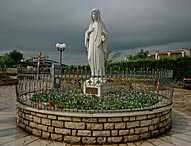date: 24.02.2021.
This Lent, parish of Medjugorje and Information Centre Mir Medjugorje are preparing Lenten reflections on Wednesdays. These reflections will take place on Wednesday, after the evening prayer programme, livestreamed on our YouTube channels and FaceBook pages, and also broadcasted live in radio programme.
These reflections will be given by Fr. Marinko Šakota, Fr. Stanko Mabić and Fr. Ante Vučković, and the first one about fasting given by Fr. Marinko Sakota is available HERE.
Fasting is one of the first and the most important invitations of Our Lady in Medjugorje.
We find the invitation to fasting already in the beginning of the Holy Bible, in the Book of Genesis («You are free to eat from any of the trees of the garden except the tree of the knowledge of good and evil!» Genesis 2, 16), but, it is also present in the other books of the Bible. Jesus was fasting the first Christian communities fasted too. Praxis of fasting is present throughout the entire history of Christianity, but in the 20th century it was practically lost.
One priest was once sharing this with Fr. Slavko Barbaric: „Here (in Međugorje), I became aware that in 30 years of preaching I never spoke to people about fasting, I never explained why, how, never told them about dangers or advantages. I would only mention fasting in the Lent. Now, when I read the Holy Scripture, I wonder how it was possible not to see this message, when it is nearly on every page. How was that possible, I wonder all the time and I am afraid there are many more messages awaiting for my personal conversion, so I would only then discover those.“
What is fasting? Fasting is not a diet. While diet aims only on body, the Christian understanding is more about the interior and change of hearts.
Fasting is «act of humility before God and penitential expression of our need for conversion from sins and selfishness so we would love God above all and our neighbours as brothers and sisters. The purpose of fasting is transforming our entire being – body, soul and spirit. It is accompanied by prayer and deeds of mercy.»
Fasting it the act in which I question myself to see HOW I FEED MYSELF AND WHAT DO I LIVE ON…
HOW TO FAST?
We notice invitation to fasting in Our Lady’s messages. Once, visionaries asked Our Lady which is the best way of fasting. Our Lady said: “The best way of fasting is on bread and water.” (July 21, 1981)
On the other occasion Our Lady invited us „strictly to fast“ (August 14, 1984)
“Therefore, I call of you, dear children, to pray and fast still more firmly.» (August 25, 1991)
Then Our Lady invites us to start growing in fasting, to live the fast within ourselves. Our Lady wants faithful not just to fast on the outside, but for fasting to be inner act. She invites therefore: Fast with the heart.
“Today I call on you to begin fasting with the heart. There are many people who are fasting, but only because everyone else is fasting. It has become a custom which no one wants to stop. I ask the parish to fast out of gratitude, because God has allowed me to stay this long in this parish. Dear children, fast and pray with the heart!” (September 20, 1984)
There are two ways of fasting:
a) out of tradition;
b) with the heart
Fasting is a process, from tradition to the heart.
From the outside to our interior. It is about not just remaining on the outside, but to enter into our hearts.
« Yet even now—oracle of the LORD—return to me with your whole heart, with fasting, weeping, and mourning. Rend your hearts, not your garments, and return to the LORD, your God, For he is gracious and merciful, slow to anger, abounding in steadfast love, and relenting in punishment.» (Joel 2, 12-13)
Fasting is not the deed of merit before God. Let us recall pharisee who was praying the temple and fasting twice a week. Jesus says that his prayer and fasting have no value before God. Fasting is not the deed of inheriting merits before god. We do not become better or greater in God’s eyes when we fast. God only cares for what happens in us when we fast. We emphasise fasting so the others would hear about that? Why is Jesus against others knowing that we fast?
We do not fast so we would pleased others.
Fasting can be used so we can feed and strengthen our ego, and we should be going in the opposite direction: to weaken our ego and be freed from it.
WHEN TO FAST?
The Queen of Peace invites us to fasting twice a week, on Wednesdays and Fridays.
LIFE WITH BREAD AND WATER
Fasting is not just renunciation from something! Fasting is life with bread and water. On the fasting days, I live with bread and water. This is my food I live on.
The rule is – drink bread and eat water
When eating bread, we should break it and eat slowly, chew it many times until it becomes a liquid. When we drink water, we should take each sip and drink slowly. The point is in tasting bread and water. This act of consuming bread and water can be turned in prayer: Jesus, thank you…Jesus, you are the bread of life…
PHYSICAL DYMENSION OF FASTING
Fasting, as understood in Christianity is about the entire man – his body, soul and spirit. It is a process that starts from our outside, but does not stop there. Its goal is the change of our hearts and deepening of relationship with God.
Fasting against the body seems as correction of wrong way of nutrition and diet. Since many of us eat one third more than we really need, fasting discovers extra weight that burdens our bodies. Due to that extra weight, our heart suffers, but also other organs and our immune system is lowered to. «This happens to everyone who eats fast, for those people cannot know how much food his body needs and this is how connection within us is broken, body cannot send signals when it does not need any more food and drinks. This is conscious response from our brains that fails. This can be fatal for any organism.»(Fr. Slavko Barbarić, OFM)
Due to speed in eating and many other reasons, so many terrorise their bodies, for they cannot know when the body says: enough! Fr. Slavko concludes: If we cannot hear our own body when we exaggerate in food, how can we hear someone else?
This does not imply that obese people are bad, nor slim are good, nor the obesity is obstacle to holiness. On the contrary, there were many obese saints.
There is a story how other brothers had to carve out the table so one of their friars could sit down, and this was a great saint, St. Thomas Acquinas.
However, regardless of good temper of obese people, one should be attentive to the body our Creator had given us, and fasting is one of those ways. Besides getting rid of all those things we do not need, fasting is the hygiene of our bodies for body can be cleansed from all toxins that accumulated in it. There is a Chinese proverb: «A quarter of food for your body, three quarters for a doctor!» There is another proverb: «Let the food be your medicine, not medications your food.»
Of course, body and soul are connected and one affects the other, so we should be very attentive to the food we take, but also to the state of our spirit. When one of our Franciscans was celebrating his 106th birthday, someone asked him what was he had been eating for his longevity. He responded: «It is not about what you eat, but what is eating you.»
The purpose of fasting is not only in renouncing from food and drinks. Renounciation is only the beginning but the purpose is in change of our interior. St. John Chrysostom warned about this: «Let our tongue fast from ugly and harmful words, for what is the use if we avoid hen or fish and on the other side, we ‘chew’ our brothers.»
Josef Ratzinger (later Papa Benedict XVI.) also wrote about fasting with selfish motives: «The truth is that fasting today is different and it happens for various reasons: medical, aesthetic, and that is good too. But only such fasting is not enough for man, the purpose of such fasting remains its own ‘self. Such fasting does not liberate man, but is there just for him.»
With fasting we need to be careful not to remain with care for the outside appearance, for that is the wrong example. As the example, Jesus gives us this story: «The Pharisee took up his position and spoke this prayer to himself, ‘O God, I thank you that I am not like the rest of humanity—greedy, dishonest, adulterous—or even like this tax collector.12I fast twice a week, and I pay tithes on my whole income.» (Lk 18, 11-12)
«In our own day, fasting seems to have lost something of its spiritual meaning, and has taken on, in a culture characterized by the search for material well-being, a therapeutic value for the care of one’s body. Fasting certainly bring benefits to physical well-being, but for believers, it is, in the first place, a “therapy” to heal all that prevents them from conformity to the will of God.» ( Pope Benedict XVI.)
The Lent that is before us is the opportunity to live fasting as a therapy that turns our gaze to Risen Lord and brings us closer and conforms us to His love.



